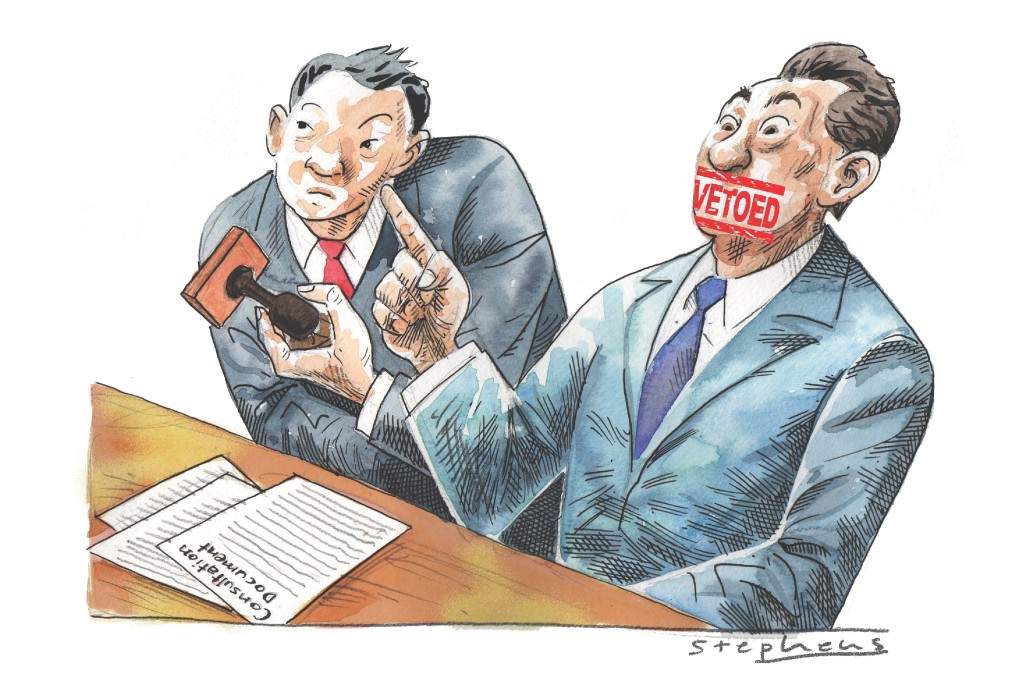Pan-democrats must seek talks, as a veto is likely to serve Beijing's interests most
Simon Young says pan-democrats can "seize the opportunity" by drawing up a list of negotiable demands and seeking talks with the government, to test its commitment to universal suffrage - before they consider a veto

There are growing signs that both the central and Hong Kong governments no longer see universal suffrage in 2017 as a priority. Did they ever? I think they did because it was perceived as a way to confer greater legitimacy on those in power and thereby aid in their ability to govern. However, it seems that after the Occupy protests there is now an indifference if not hesitation in taking this major step in political reform.
If movement towards universal suffrage invites disruptive unlawful protests and interference by foreign governments, then Hong Kong is not ready for universal suffrage, nor is the central government. The signs of this new thinking are telling.
We are told not to get our hopes up with the second round of consultation. At the launch, the chief secretary said that in relation to the constitutional and legal framework, "there is no room for any concessions or compromises to be made in order to win over the support from the pan-democratic members". The next day, the secretary for constitutional and mainland affairs "confessed … there is not much room there for us to do anything significant so as to convince the 27 pan-democratic members to change their mind". On the radio, the secretary for justice described the task as "very close to mission impossible".
Beyond its flashy cover, the consultation document exudes little enthusiasm for reform. There are few if any new ideas or bridging points for legislators to seize upon. On the design of the nominating committee, instead of progressive suggestions such as abolishing corporate voting, rethinking existing subsectors, or allowing directly elected committee members, the aim is to maintain the status quo because "the wish of each subsector should be respected and widespread support from the relevant subsectors should be obtained, otherwise politically it would be difficult to forge consensus". Such conservatism ensures a narrow base for the nominating committee, as different views on how to expand it will be ignored on the grounds that a consensus has yet to be forged.
This is what happened to the issue of the political party affiliation of the chief executive. In the first consultation document, we were told this bar might be lifted in the review of local legislation. However, in the second document, the issue has been taken off the table because the government has yet to introduce a law on political parties and "different sectors of the community have yet to arrive at a clear consensus" - again, that familiar expression. One would have thought universal suffrage, if one is serious about it, elevates the status of political parties.
Nor was there any more enthusiasm for democracy in the policy address, which reminded us that "universal suffrage" are words found in the Basic Law and not the Sino-British Joint Declaration. There is a bare promise to "lobby" legislators to obtain the two-thirds majority support, but up to now we see no attempt to engage them in dialogue and negotiations. The continued aspersions about foreign interference do nothing to alleviate the mistrust between the relevant stakeholders.
The pan-democrats' veto will likely serve the interests of the central and Hong Kong governments most. Pan-democrats will be blamed for frustrating the public's aspiration for universal suffrage and will suffer the consequences in future polls. The secretary for constitutional and mainland affairs has already drawn attention to these potential consequences in referring to the "worst-case scenario".